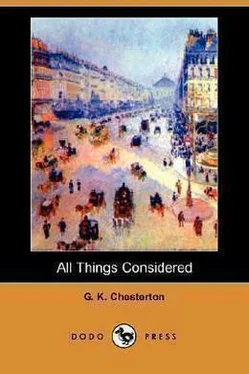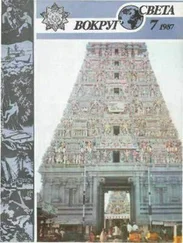The thing can only be made clear to Englishmen by turning it round. Suppose a Frenchman came out of democratic France to live in England, where the shadow of the great houses still falls everywhere, and where even freedom was, in its origin, aristocratic. If the Frenchman saw our aristocracy and liked it, if he saw our snobbishness and liked it, if he set himself to imitate it, we all know what we should feel. We all know that we should feel that that particular Frenchman was a repulsive little gnat. He would be imitating English aristocracy; he would be imitating the English vice. But he would not even understand the vice he plagiarised: especially he would not understand that the vice is partly a virtue. He would not understand those elements in the English which balance snobbishness and make it human: the great kindness of the English, their hospitality, their unconscious poetry, their sentimental conservatism, which really admires the gentry. The French Royalist sees that the English like their King. But he does not grasp that while it is base to worship a King, it is almost noble to worship a powerless King. The impotence of the Hanoverian Sovereigns has raised the English loyal subject almost to the chivalry and dignity of a Jacobite. The Frenchman sees that the English servant is respectful: he does not realise that he is also disrespectful; that there is an English legend of the humorous and faithful servant, who is as much a personality as his master; the Caleb Balderstone, the Sam Weller. He sees that the English do admire a nobleman; he does not allow for the fact that they admire a nobleman most when he does not behave like one. They like a noble to be unconscious and amiable: the slave may be humble, but the master must not be proud. The master is Life, as they would like to enjoy it; and among the joys they desire in him there is none which they desire more sincerely than that of generosity, of throwing money about among mankind, or, to use the noble mediæval word, largesse—the joy of largeness. That is why a cabman tells you are no gentleman if you give him his correct fare. Not only his pocket, but his soul is hurt. You have wounded his ideal. You have defaced his vision of the perfect aristocrat. All this is really very subtle and elusive; it is very difficult to separate what is mere slavishness from what is a sort of vicarious nobility in the English love of a lord. And no Frenchman could easily grasp it at all. He would think it was mere slavishness; and if he liked it, he would be a slave. So every Englishman must (at first) feel French candour to be mere brutality. And if he likes it, he is a brute. These national merits must not be understood so easily. It requires long years of plenitude and quiet, the slow growth of great parks, the seasoning of oaken beams, the dark enrichment of red wine in cellars and in inns, all the leisure and the life of England through many centuries, to produce at last the generous and genial fruit of English snobbishness. And it requires battery and barricade, songs in the streets, and ragged men dead for an idea, to produce and justify the terrible flower of French indecency.
When I was in Paris a short time ago, I went with an English friend of mine to an extremely brilliant and rapid succession of French plays, each occupying about twenty minutes. They were all astonishingly effective; but there was one of them which was so effective that my friend and I fought about it outside, and had almost to be separated by the police. It was intended to indicate how men really behaved in a wreck or naval disaster, how they break down, how they scream, how they fight each other without object and in a mere hatred of everything. And then there was added, with all that horrible irony which Voltaire began, a scene in which a great statesman made a speech over their bodies, saying that they were all heroes and had died in a fraternal embrace. My friend and I came out of this theatre, and as he had lived long in Paris, he said, like a Frenchman: "What admirable artistic arrangement! Is it not exquisite?" "No," I replied, assuming as far as possible the traditional attitude of John Bull in the pictures in Punch —"No, it is not exquisite. Perhaps it is unmeaning; if it is unmeaning I do not mind. But if it has a meaning I know what the meaning is; it is that under all their pageant of chivalry men are not only beasts, but even hunted beasts. I do not know much of humanity, especially when humanity talks in French. But I know when a thing is meant to uplift the human soul, and when it is meant to depress it. I know that 'Cyrano de Bergerac' (where the actors talked even quicker) was meant to encourage man. And I know that this was meant to discourage him." "These sentimental and moral views of art," began my friend, but I broke into his words as a light broke into my mind. "Let me say to you," I said, "what Jaurès said to Liebknecht at the Socialist Conference: 'You have not died on the barricades'. You are an Englishman, as I am, and you ought to be as amiable as I am. These people have some right to be terrible in art, for they have been terrible in politics. They may endure mock tortures on the stage; they have seen real tortures in the streets. They have been hurt for the idea of Democracy. They have been hurt for the idea of Catholicism. It is not so utterly unnatural to them that they should be hurt for the idea of literature. But, by blazes, it is altogether unnatural to me! And the worst thing of all is that I, who am an Englishman, loving comfort, should find comfort in such things as this. The French do not seek comfort here, but rather unrest. This restless people seeks to keep itself in a perpetual agony of the revolutionary mood. Frenchmen, seeking revolution, may find the humiliation of humanity inspiring. But God forbid that two pleasure–seeking Englishmen should ever find it pleasant!"
The difference between two great nations can be illustrated by the coincidence that at this moment both France and England are engaged in discussing the memorial of a literary man. France is considering the celebration of the late Zola, England is considering that of the recently deceased Shakspere. There is some national significance, it may be, in the time that has elapsed. Some will find impatience and indelicacy in this early attack on Zola or deification of him; but the nation which has sat still for three hundred years after Shakspere's funeral may be considered, perhaps, to have carried delicacy too far. But much deeper things are involved than the mere matter of time. The point of the contrast is that the French are discussing whether there shall be any monument, while the English are discussing only what the monument shall be. In other words, the French are discussing a living question, while we are discussing a dead one. Or rather, not a dead one, but a settled one, which is quite a different thing.
When a thing of the intellect is settled it is not dead: rather it is immortal. The multiplication table is immortal, and so is the fame of Shakspere. But the fame of Zola is not dead or not immortal; it is at its crisis, it is in the balance; and may be found wanting. The French, therefore, are quite right in considering it a living question. It is still living as a question, because it is not yet solved. But Shakspere is not a living question: he is a living answer.
For my part, therefore, I think the French Zola controversy much more practical and exciting than the English Shakspere one. The admission of Zola to the Pantheon may be regarded as defining Zola's position. But nobody could say that a statue of Shakspere, even fifty feet high, on the top of St. Paul's Cathedral, could define Shakspere's position. It only defines our position towards Shakspere. It is he who is fixed; it is we who are unstable. The nearest approach to an English parallel to the Zola case would be furnished if it were proposed to put some savagely controversial and largely repulsive author among the ashes of the greatest English poets. Suppose, for instance, it were proposed to bury Mr. Rudyard Kipling in Westminster Abbey. I should be against burying him in Westminster Abbey; first, because he is still alive (and here I think even he himself might admit the justice of my protest); and second, because I should like to reserve that rapidly narrowing space for the great permanent examples, not for the interesting foreign interruptions, of English literature. I would not have either Mr. Kipling or Mr. George Moore in Westminster Abbey, though Mr. Kipling has certainly caught even more cleverly than Mr. Moore the lucid and cool cruelty of the French short story. I am very sure that Geoffrey Chaucer and Joseph Addison get on very well together in the Poets' Corner, despite the centuries that sunder them. But I feel that Mr. George Moore would be much happier in Pere–la–Chaise, with a riotous statue by Rodin on the top of him; and Mr. Kipling much happier under some huge Asiatic monument, carved with all the cruelties of the gods.
Читать дальше








